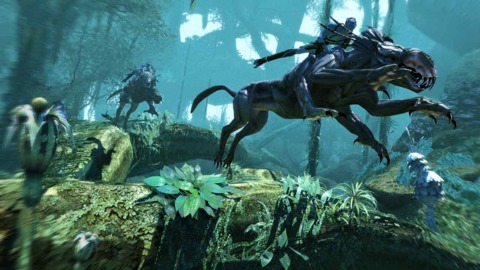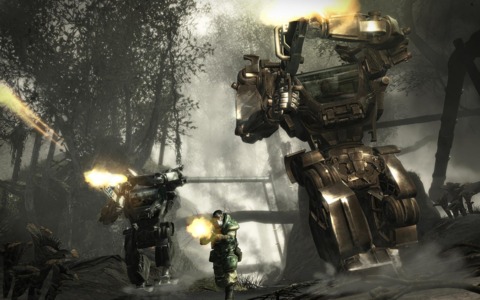
Like the new movie, Avatar: The Game splits the action between the materialistic, militaristic future humans trying to pillage the copious resources of the fantastic moon Pandora, and the mystical indigenous blue Na'vi desperately defending their homeland. Two years before the movie takes place, you're a human agent who also happens to be genetically compatible with an "avatar," a lab-grown human/Na'vi hybrid that the DNA donor can then control remotely from the comfort of a pod that looks like a tanning bed. The avatars seem best suited to diplomatic relations with the natives, but they also work in a pinch when you decide to relinquish your humanity and join up with those natives to fight the encroaching corporate interests. (Again, I learned most of this from watching that trailer, since the game thrusts you straight into bland jungle shooting with little preamble.)

It's a shame, too, because someone at Ubisoft wanted to add some depth to this game. There's a pretty robust experience and level-up system in here that gradually earns you better weapons and armor, along with a whole host of special abilities, to use in combat. But it's a pain to constantly enter the menu and swap those weapons and abilities in and out, and then, the campaign isn't an entertaining place to use them anyway. Then there's the almost inexplicable inclusion of a "conquest" mode that resembles the board game Risk, where you deploy units to take over abstract territories on the globe of Pandora and reap benefits that apply back to the single-player game. But since the currency in the conquest mode comes from the experience you get in the campaign, it makes it much easier to succeed in conquest after playing most of the campaign, at which point those benefits won't mean much. It's a weird, unfortunate catch-22 situation. More generally, it's pretty faint praise for Avatar that I found this conquest mode one of the more enjoyable segments of the whole game.

Avatar is generally a flat-looking game by contemporary standards, but it's worth noting as one of the first games to support a wide array of modern 3D technology. Don't expect to whip out an old '50s pair of red-and-blue glasses to use them, though; you need a new television set equipped with specific 3D hardware to use any of it. If brands like Sensio and RealD mean anything to you, Avatar might make for a novel demo, but don't expect the game itself to be much fun. (Don't count on a few throwaway lines from Sigourney Weaver to enhance the storytelling much, either.)
Fancy whiz-bang 3D effects wouldn't do much to rescue the clunky, mundane action here anyway. Avatar, the film, may indeed advance the art of filmmaking as its tremendous hype has portended--the early reviews at the time of this writing are positive enough, anyway--but Avatar: The Game won't change the poor reputation of movie-licensed games one iota.